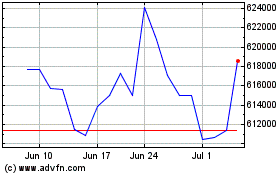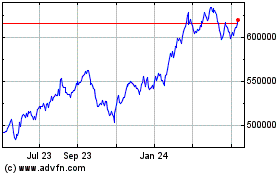Investing in the shares, which are up 8% since the election, is
seen as a bet on U.S. growth
By Nicole Friedman
Warren Buffett was one of Donald Trump's biggest critics during
the final months of the presidential campaign. Now he is one of the
biggest beneficiaries of a Trump-influenced market rally boosting
the value of everything from banks to railroads.
Mr. Buffett's Berkshire Hathaway Inc. posted its best month in
six years in November, and its shares are trading at all-time highs
at $240,000. The conglomerate's market capitalization, which stood
at roughly $20 million when Mr. Buffett acquired the former textile
maker in 1965, is hovering just below $400 billion.
Berkshire, which owns traditional businesses such as insurers,
railroads, utilities and manufacturers, stands in the echelon of
tech giants. It is the fourth-biggest U.S. company by market
capitalization, according to FactSet, below Apple Inc., Alphabet
Inc. and Microsoft Corp. Mr. Buffett, Berkshire's chairman and
biggest shareholder, is the world's third-richest man, according to
Forbes.
U.S. stocks have risen since the presidential election on the
expectation that Mr. Trump's administration and Republican
leadership in Congress will roll back taxes and regulations. The
S&P 500 has gained 3% to 2204.71 from Nov. 8 through
Monday.
In that period, Berkshire Class A and Class B shares have both
risen about 8%. Both classes of shares rose Monday, with A shares
up 0.4% to $240,000 and Class B up 0.5% to $160.21.
Mr. Buffett, a Democrat, campaigned for Hillary Clinton and
criticized Mr. Trump during the campaign. After Mr. Trump alleged
at a presidential debate that Mr. Buffett had taken a "massive"
deduction on his taxes, Mr. Buffett publicly released his personal
tax information and challenged the Republican candidate to do the
same.
Mr. Buffett didn't respond to a request for comment. In April,
he told shareholders that Berkshire would "continue to do fine" no
matter which candidate was elected president. Following the
election, Mr. Buffett told CNN that his investing decisions had
been unaffected by the election and that Mr. Trump "deserves
everybody's respect."
"The stock market will be higher 10, 20, 30 years from now," Mr.
Buffett said in a CNN interview aired Nov. 11. "It would have been
with Hillary, and it will be with Trump."
Helping drive Berkshire's stock higher is a broad exposure to
the financial industry through its ownership of insurance companies
and banks. Notably, J.P. Morgan Chase & Co. and Goldman Sachs
Group Inc. are two of the best performers in the Dow Jones
Industrial Average since the election.
Berkshire's investment portfolio owns large stakes in financial
companies including Wells Fargo & Co. and American Express Co.,
and the company recently bought shares in four major U.S. airlines.
Wells Fargo stock slid this fall due to its sales-practices scandal
but has risen alongside other banks since the election.
Financial firms across the market have benefited from a belief
that a Trump administration will help fuel a shift to higher
interest rates, as well as push for less onerous regulation of the
industry, according to analysts.
An investment in Berkshire is also a bet on U.S. growth, given
the firm's broad diversification. Berkshire sells electricity,
furniture, cars, newspapers and other goods through its subsidiary
companies. Its BNSF Railway Co. is one of the biggest in the
U.S.
"There is this sense that after this surprise election, under
President Trump there will be more rapid growth than there would
have been otherwise," said Meyer Shields, managing director at
Keefe, Bruyette & Woods. "Berkshire is represented in all
elements of the economy."
Mr. Buffett built Berkshire Hathaway, originally a New England
textiles company, into a powerhouse over five decades through
long-term stock investments and dozens of acquisitions. One of the
company's enduring advantages has been its ability to profitably
invest "float," the cash given to the company as insurance premiums
that doesn't have to be paid out until years later. Berkshire's
insurance float stood at $91 billion at the end of the third
quarter, according to the company.
Since Mr. Buffett acquired Berkshire in 1965, its per-share
market value has posted a compounded annual gain of 21% through
2015. Class A shares are up more than 21% this year.
Some investors may be buying Berkshire shares postelection as a
defensive bet because Mr. Buffett's value-oriented investment
strategy can outperform during market routs, said Paul Lountzis,
president of Lountzis Asset Management LLC, which owns Berkshire
shares.
"It's a safe place to put your money. [Berkshire has] a broad
diverse set of revenues," Mr. Lountzis said. "If we would go into a
very difficult time on the equities side, Berkshire has proven
repeatedly that they are a Fort Knox."
Write to Nicole Friedman at nicole.friedman@wsj.com
(END) Dow Jones Newswires
December 06, 2016 02:48 ET (07:48 GMT)
Copyright (c) 2016 Dow Jones & Company, Inc.
Berkshire Hathaway (NYSE:BRK.A)
Historical Stock Chart
From Mar 2024 to Apr 2024

Berkshire Hathaway (NYSE:BRK.A)
Historical Stock Chart
From Apr 2023 to Apr 2024
